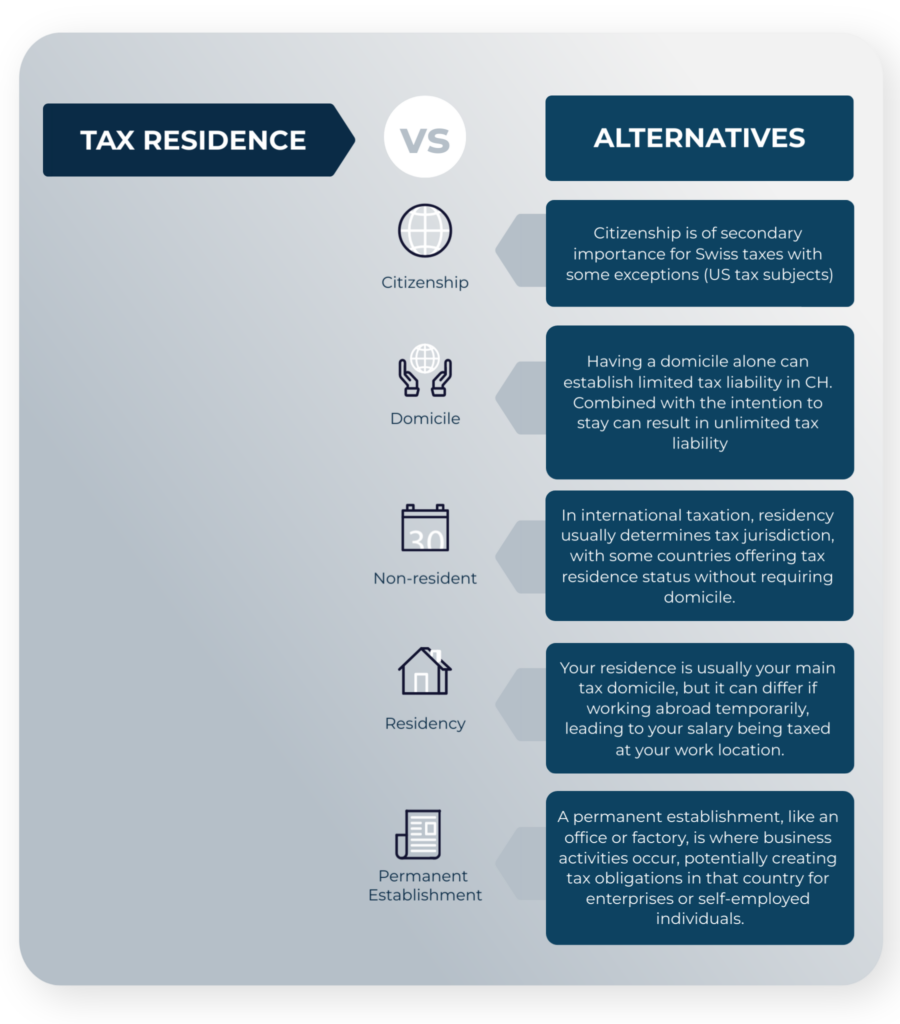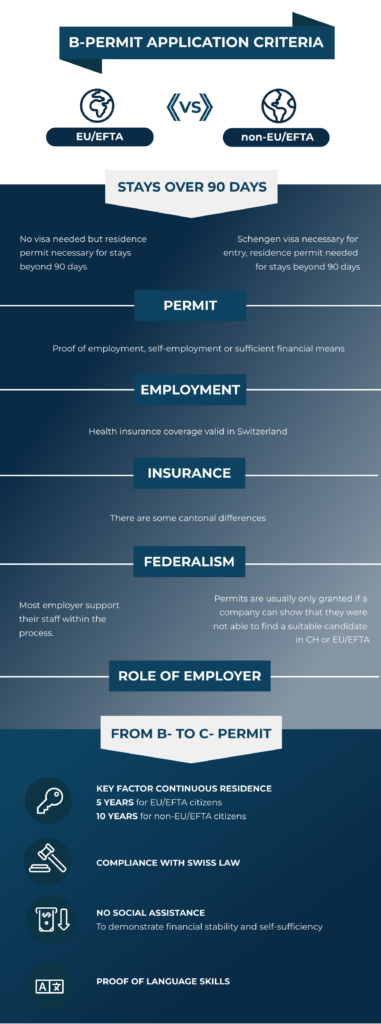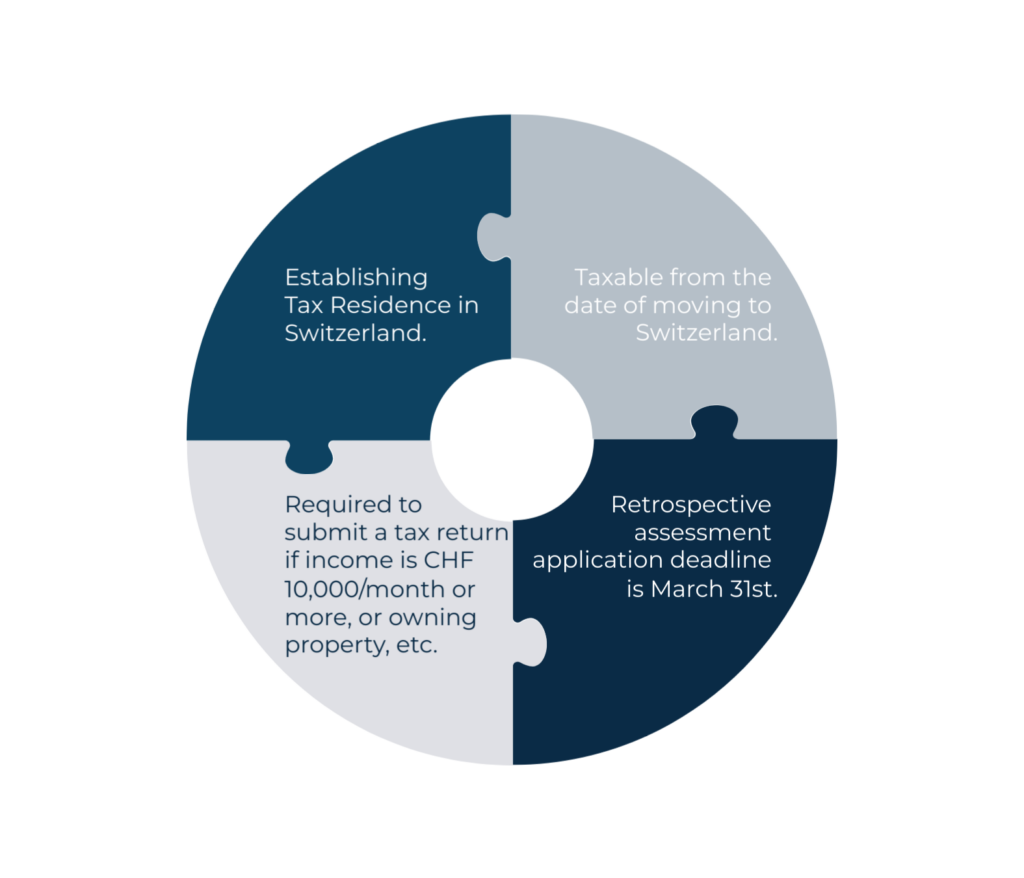Tax Residence in Switzerland Part 1: Permits and Basic Tax Principles
What Is a Residence Permit?
How To Get a Residence Permit in Switzerland
EU/EFTA citizens can obtain a residence permit in Switzerland by following a relatively straightforward process. While they don’t need a visa for short stays, a residence permit is required for stays exceeding 90 days. The process involves applying at the local cantonal migration office, providing proof of employment, self-employment, or sufficient financial means, along with health insurance coverage valid in Switzerland. The permit must be renewed annually, and after five continuous years, individuals become eligible to switch to a more stable C-permit.
For non-EU/EFTA citizens, the process is more complex. A (Schengen-) visa is necessary for entry, and a residence permit is essential for stays beyond 90 days. Non-EU/EFTA nationals must apply at the local cantonal migration office, submitting documentation such as an employment contract, proof of financial means, and valid health insurance. Patience is crucial during the processing period, and renewal is typically required annually. After ten years with a B-permit, there’s the possibility of transitioning to a more stable C-permit.
It is much easier to obtain a B-permit for non-EU/EFTA citizens if you apply for a job in Switzerland or your employer transfers you to Switzerland for limited or unlimited time. Then, your employer helps you and/or manages the whole process for you. The number of immigrants from non-EU/EFTA countries is limited and permits are usually only granted if a company can show that they were not able to find a suitable candidate in Switzerland or EU/EFTA.
It is worth mentioning that tourist visas do not allow you to conduct a gainful activity and violations and / or overstay might result in deportation and / or entry ban.
Residency Tests
Depending on the permit, language skills need to be provided. C-permit requires better language skills than B-permit and application for Swiss passport requires higher skills than C-permit.
As a rule, proof of language proficiency can be provided by means of a corresponding language diploma. The language diplomas can be taken in Switzerland or abroad. Persons whose native language is the usual local language in Switzerland or who have already studied or attended school in the usual local language in Switzerland for several years do not need to present a diploma.
A German speaker from Germany or Austria therefore does not need to have a diploma in German if they wish to settle in German-speaking Switzerland. On the other hand, language skills in Italian would have to be proven if this person wanted to settle in Ticino, for example.
Swiss B Permit
What Is a B Permit?
The Swiss Residence B-Permit is a key document for both EU/EFTA and non-EU/EFTA citizens seeking to live and work in Switzerland. This permit grants temporary residence and is often tied to employment or other qualifying factors. It signifies a legal status in the country and is an essential step for those planning a more extended stay.
Persons with a Swiss work and residence permit (B permit) can be self-employed or employed. In contrast to short-term residents (L-permit; usually short term employment of only a few weeks / months), foreign nationals in possession of a B permit can take up a new salaried position without further ado. However, there is an exception for third-country nationals whose permit was issued expressly for a specific position (e.g. as part of a project assignment) or is expressly linked to a condition or requirement under labour market law. In this case, the change of job must be applied for with the competent cantonal authority.
Similarly, for third-country nationals, a change from employment to self-employment requires authorisation. This does not apply to EU-EFTA citizens with a B permit (however, at the time the permit is extended, it may be checked whether the requirements for a permit based on self-employment are met).
The location of the new job is generally not restricted; employment can be accepted anywhere in Switzerland, i.e. also in another canton. For third-country nationals, however, a change of canton is subject to authorisation.
B Permit Requirements
To obtain a B-Permit, whether you are an EU/EFTA citizen or a non-EU/EFTA citizen, certain requirements must be met. These typically include proof of employment, self-employment, or sufficient financial means, along with valid health insurance coverage and adequate accommodation. Non-EU/EFTA citizens may have additional requirements, such as a visa for entry.
How To Get a B Permit
Getting a B-Permit involves applying at the local cantonal migration office. The application process includes submitting the required documents, which may vary based on individual circumstances. It’s essential to gather all necessary paperwork and adhere to the specific guidelines provided by the local authorities. Of course, thanks to federalism, there are also some cantonal differences here, just contact the cantonal migration or employment authorities of your commune of residence: https://bit.ly/3SDLw76.
Employers often support transferred employees or non-Swiss hires in the process of getting the residence permits. On the one hand, to make it easier for employees to arrive in Switzerland, but also to ensure that they enter the country legally and have the correct work and residence permits when they take up employment.
How Long Does It Take To Get a B Permit?
The processing time for a B-Permit can vary, and patience is key during this period. Factors such as the local cantonal office’s workload and the completeness of your application can influence the duration. Applicants are encouraged to plan ahead and inquire about expected timelines during the application process.
B Permit Renewal
Both EU/EFTA and non-EU/EFTA citizens with a B-Permit typically need to renew their permits annually. The renewal process involves demonstrating continued compliance with the permit requirements, such as employment or financial stability. Staying informed about renewal deadlines and requirements is crucial for a seamless extension process.
Swiss B Permit And Marriage
In the case of marriage, spouses can apply for dependent permits to join the B-Permit holder. However, in the event of a divorce, the individual’s permit status may be affected. It’s advisable to consult with local migration authorities to understand the implications and navigate any necessary adjustments.
Travelling With a Swiss B Permit
If you have a B or C permit, you do not need a visa to enter Switzerland or to travel to other Schengen states. However, you may stay in other Schengen states for a maximum of 90 days over a period of 180 days, regardless of your nationality.
Leaving Switzerland B Permit
Before leaving Switzerland permanently, individuals with a B-Permit should notify the authorities. Additionally, it’s important to keep the permit valid in case of a potential return. Proper communication with the local migration office ensures compliance with departure procedures and maintains a smooth record for future visits or relocation.
Switching From a B To C Permit
After five continuous years with a B-Permit (for EU/EFTA citizens) or ten years (for non-EU/EFTA citizens), individuals become eligible to switch to a more stable C-Permit. The C-Permit offers increased stability and fewer restrictions on residence. Applying for the switch typically involves fulfilling certain criteria, and individuals are encouraged to explore this option for a more permanent status in Switzerland.
Swiss C Permit
What is a C Permit?
The Swiss Residence C-Permit, also known as a settlement permit, is a more permanent residency status in Switzerland. It is typically granted after a certain period of continuous residence, offering greater stability and fewer restrictions compared to the B-Permit. The C-Permit signifies a commitment to long-term residence in Switzerland.
C Permit Benefits
Permanent residency: The C-Permit provides a more stable and long-term residency status. It signifies a commitment to long-term residence in Switzerland.
Freedom to change employment:If you have a permanent residence (C-permit), there are no restrictions on changing jobs. Both EU/EFTA nationals and third-country nationals can enter the Swiss labour market in the same way as Swiss nationals.
Fewer restrictions: C-Permit holders face fewer restrictions on residence and can stay in Switzerland without the need for continuous employment. This provides individuals with more freedom in their personal and professional lives.
Your salary is no longer subject to tax at source. Instead, you file an ordinary annual tax return that determines your tax liability. Only B permit holders earning more than CHF 120’000 gross need to file a tax return.
C Permit Requirements
To obtain a C-Permit, both EU/EFTA and non-EU/EFTA citizens must fulfill certain criteria:
Continuous Residence: Typically, a minimum of five years for EU/EFTA citizens and ten years for non-EU/EFTA citizens with a B-Permit. This continuous residence is a key factor in qualifying for the more permanent C-Permit.
Compliance with Swiss Laws: Applicants must have adhered to Swiss laws and regulations during their residency. This includes obeying local laws and contributing positively to the community.
No Social Assistance: A clean record of not relying on social assistance during the qualifying period. This demonstrates financial stability and self-sufficiency.
Proof of language skills: See above (“Residency test”). To obtain a C-permit, higher minimum standards are applied compared to B-permit holders.
How To Get a C Permit
Apart from the requirements mentioned above, individuals must submit an application and submit the necessary documentation which may include proof of continuous residence, financial stability, and compliance with Swiss laws.
C Permit Renewal
Unlike the B-Permit, the C-Permit does not require regular renewals. Once granted, it signifies a more permanent status, providing residents with greater stability and freedom from annual permit renewals.
Swiss C Permit And Marriage
In case of marriage, the spouse can apply for a dependent permit to join the C-Permit holder. In the event of a divorce, the C-Permit status is generally not affected. Legal processes and considerations may vary, consulting with local migration authorities is advisable.
Leaving Switzerland With C permit
If leaving Switzerland for short (vacation) with a C Permit, there are generally no specific departure requirements. The C-Permit remains valid, and individuals can return to Switzerland without issues.
In case of permanent relocation to another country, residence permit expires upon deregistration or if the foreign national stays abroad for six months or more. The C permit may be maintained for some years based on a reasoned request (e.g. work abroad for a limited period of time, semester abroad, etc.).
Obtaining Swiss Passports
After holding a C-Permit for at least five years, individuals may become eligible to apply for Swiss citizenship. However, this process can vary, and certain cantonal and communal requirements may apply. Common criteria include continuous residence (min 10 years), integration into Swiss society, and a clean legal record. Applicants typically undergo a naturalization process, including language assessments and interviews, to become Swiss citizens. It’s advisable to check with local authorities for specific requirements in your canton. Easier conditions for spouses of Swiss citizens and children may apply.
How To Get a Work Permit In Switzerland
Both B and C permits allow you to work in Switzerland, but the conditions and flexibility differ. B permits are often tied to specific employment, while C permits offer greater flexibility and permanency. Always ensure that you comply with the conditions specified in your permit and consult with the local migration office for any specific regulations in your canton.
In general, a permanent settlement permit (C permit) can be issued after ten years of residence in Switzerland if the integration criteria are met. In the case of successful integration and good communication in the national language spoken at the place of residence (at least level A2 of the European Language Portfolio), an application for a permanent residence permit can be submitted after just five years.
How Much Does It Cost To Renew a Work Permit?
The fees vary between the cantons and also depend on your individual case. B and C permits costs around CHF 50 to CHF 100. Costs for additional requirements (e.g. verifying documents, language training, etc.) may occur.
Tax Residence
What Is Tax Residence?
The tax residence determines where an individual has their main tax domicile. The tax law at the main tax domicile defines what is subject to which tax.
What Makes You a Tax Resident?
An individual is resident in Switzerland for tax purposes if he or she stays here with the intention of remaining permanently or if federal law assigns him or her a special legal domicile here.
A person is deemed to be resident in Switzerland for tax purposes if he or she stays in Switzerland for at least 30 days and is gainfully employed or stays for at least 90 days and is not gainfully employed, regardless of any temporary interruption.
Other countries have different definitions of tax residence. In order to avoid a person having more than one tax residence under local law, double taxation treaties contain provisions on how to deal with such conflicts and avoid the resulting double residence.
If you move to Switzerland during the year, you are liable to pay tax in Switzerland from the date you move. To determine the applicable tax rate, the regular income during the year is extrapolated to a full year. The tax rate calculated in this way is applied to the taxable income in Switzerland.
In case you are taxed at source and your income (gross) is CHF 10,000 or more per month, you will be asked to submit a tax return in the course of the following year. This also applies if you own a real estate in Switzerland, your are married to a Swiss citizen or C-permit holder
Important note: If your gross income taxed at source is less than CHF 10,000 per month and you would like to claim additional deductions (e.g. interest on debt, pillar 3a, pension fund purchases, education costs, etc.) or you have considerable other assets and income (e.g. real estate worldwise, notable investments and dividend/interest income, pensions, or the like), you must submit an application for a retrospective assessment by 31 March of the following year.
In case you intend to move from one country to another, it is highly recommended to check before the relocation what you need to do to properly end tax residence in the country you leave and what you need to do to begin tax residency in the new country. This avoids any costly problems that might occur such as overlapping tax residences or penalties if you miss any deadlines. The totality of the circumstances should make sense in a timely manner, so that the date on which the change of tax residence takes place also roughly corresponds to when you moved, for example (flight tickets) or when you cancelled and concluded new rental and employment contracts.
Individuals who are not resident in Switzerland for tax purposes may, under certain circumstances, establish a limited tax liability in Switzerland if, for example, they
– own real estate in Switzerland,
– are gainfully employed and work in Switzerland
– are self-employed in Switzerland
How To Determine Tax Residency
The determination of tax residence is based on all the circumstances of the specific individual case. The legal organisation of residence in Switzerland (e.g. registration with the residents’ registration office, obtaining a residence permit) is of secondary importance. The actual circumstances are decisive.
The centre of vital interests is decisive in determining tax residence. As a rule, the relationship to the family’s place of residence (spouse, children) outweighs the relationship to the place of work. Therefore, in most cases, the family’s place of residence, to which you return every day after work, is the relevant place of residence for tax purposes.
Disagreements with the tax authorities on this issue are rare. The tax offices check where the centre of life is located, particularly in the case of weekly residents. In the case of unmarried persons over the age of thirty, the Federal Supreme Court has ruled that the centre of life is assumed to have shifted to the place of weekly residence after a few years, unless a close connection to the place of origin can be proven (e.g. weekly return, etc.).
National and international tax law does not presuppose the legality of residence or income. This means that persons with illegal residence / without a work permit are also liable to pay tax on their income earned in Switzerland.
Tax Residency vs The Alternatives

vs Citizenship
In Switzerland, nationality is only of secondary importance when it comes to taxes. In principle, a tax situation must always be assessed in the same way, regardless of the nationality of the taxpayer.
Only in a few exceptional cases does nationality play a role. This is the case, for example, in double taxation conflicts. US citizens are subject to US tax law even if they have unlimited tax liability in Switzerland.
On the other hand, the form of residence permit (B or C permit) is more important. It determines whether a salary is subject to withholding tax or not.
vs Domicile
The circumstances of the specific individual case are decisive for determining the tax domicile. As a rule, permanent residence and the intention to remain permanently establish tax domicile. The centre of vital interests is regularly used as a further criterion.
A mere domicile (e.g. holiday property, hotel) cannot in itself justify unlimited tax liability. This is because there is generally no intention to remain there permanently. If you own a holiday property, this property constitutes a secondary tax domicile. You only have to pay those taxes there that are associated with the property (e.g. property tax, pro rata wealth tax, income tax on rental income or imputed rental value, visitor’s tax, sewage and waste disposal charges, etc.).
vs Non-Resident
Certain countries recognise special residence statuses for certain cases. For example, you can stay in a country without establishing a tax residence. Alternative taxation is often applied, e.g. based on the amount of money transferred to the country of residence (taxation on remittance basis).
Such resident-but- non-domiciled status is well known in the UK. Portugal and Thailand have similar constructs. For further information on this, you should contact a local tax advisor.
vs Residency
In the vast majority of cases, your place of residence is also your main tax domicile. This may differ in justified cases, e.g. if your employer sends you to another country for a longer, limited period of time while your family remains in your main tax domicile. In such cases, your salary will be taxed at your place of work. Under certain circumstances – within the EU/EFTA and in relation to Switzerland – the social security obligation in your home country can be maintained.
vs Permanent Establishment
A permanent establishment is a fixed place of business through which an enterprise (or a self employed individual) carries out its business activities. The presence of a permanent establishment in a country may cause tax obligations in that country. A permanent establishment can take various forms, such as a branch, office, factory, workshop, or other fixed facilities. In general, individuals who are not self-employed cannot establish a permanent establishment.
Can You be Tax Resident in Two Countries?
Tax residence is determined based on the internal law of each country. If those internal rules lead to a tax residency in two countries, double tax treaties have a set of rules designed to resolve situations where an individual or a company could be considered a tax resident in more than one country. These rules help determine in which country the person or company should be considered as tax resident when both countries claim taxing rights.
In simple terms, these so-called tie-breaker rules establish a set of criteria to determine the individual’s or company’s primary residence. The criteria often consider factors like the person’s permanent home and abode, the country where they have stronger economic and personal connections (centre of vital interests) and citizenship.
Tax Residency Exemption
A person who is domiciled abroad and is only in Switzerland to attend an educational establishment or to receive care in a sanatorium does not constitute a tax domicile or residence.
Tax Residency Application
Tax residency arises through fulfilment of the relevant criteria (in particular sufficient length of residence). Tax residency does not have to be applied for. In general, tax residency is established from the date on which you register with the residents’ registration office in Switzerland.
As a rule, the residents’ registration office and/or the tax office collects the information required for taxation and for determining tax residency upon arrival. If this changes or if you are not sure whether all the information has been recorded correctly, it is advisable to inform the tax office. For example, marital status or the number and age of children will affect which tax rate is applied for withholding tax.
In turn, you should contact the tax office if you are of the opinion that your data has not been recorded correctly. The sooner you endeavour to correct the data, the easier it will be to rectify the situation.
Please ensure that you also keep your employer up to date with regard to your personal data so that any effects on benefits and contributions from / to social security, etc. can be taken into account as soon as possible.
Tax Residency Declaration
If the tax authorities suspect that the place of residence under civil law differs from the actual place of residence, they can carry out further investigations and determine a different tax domicile by means of a ruling. The following are common cases:
Adult children who have moved to another place to study and are now working and living there after their studies, but are still registered with their parents.
Taxpayers may be tempted to register in a tax-favourable municipality while continuing to spend most of their time in a less tax-favourable location.
Certificate of Tax Residence
If you need a document showing your Swiss tax residence, this certificate of tax residence can be ordered at the cantonal tax authority. Such a certificate could be requested from banks to make sure they properly follow the anti-tax-evasion and/or anti-money-laundering rules. Further, foreign tax authorities might ask for it if you e.g ask for refunds of withholding taxes withheld from dividends or interests.
How To Change Tax Residency
If you move within Switzerland from one municipality/canton to another, taxation of ordinary income and wealth tax for the entire year is always carried out at the place where you have your main tax domicile on 31 December. There is no splitting of the tax period between the municipality of departure and the municipality of arrival and you only fill in one tax return for the whole year.
In international cases, however, taxation only takes place on a pro rata basis from the time you move to Switzerland. Income earned before moving to Switzerland is not taxable in Switzerland.
In the case of real estate, taxation begins with the purchase and ends with the sale. You are also obliged to submit a tax return at the location of the property. You can fulfil this obligation by submitting a copy of the tax return from your main tax domicile.
For real estate outside Switzerland, the tax law of the local country is applicable.
Tax Residency Advice
It is important that you always make enquiries before changing your tax residence. Find out in your country of departure what precautions you need to take. In Switzerland, changes of residence must always be reported to the relevant authorities (municipality). Holders of B and C permits should contact the migration office in advance. Employers should also be informed promptly of any changes to their place of residence so that any withholding tax can be settled correctly.
Changes, for example, to your place of residence, change of marital status, birth of children or with regard to your B or C permit also have an impact on your tax situation. As a rule, tax-relevant changes are forwarded to the tax offices so that they can be taken into account if necessary.
This will help you to avoid complicated corrections or overlapping tax residences with possible double taxation.


